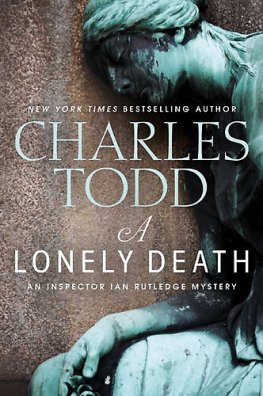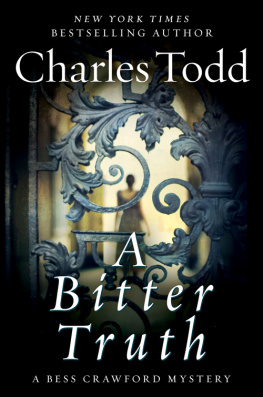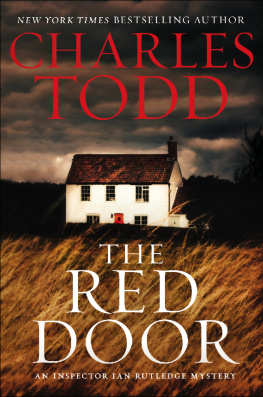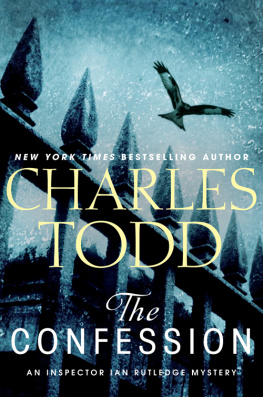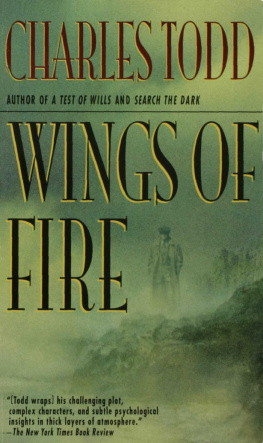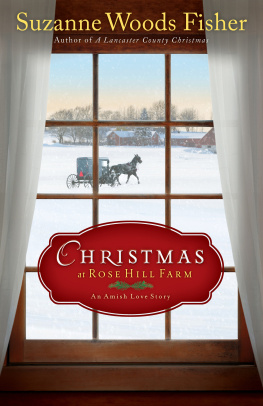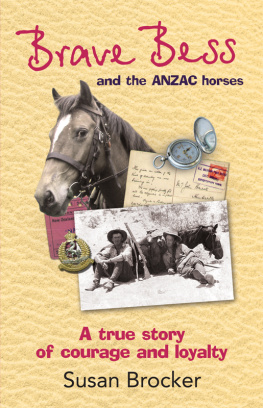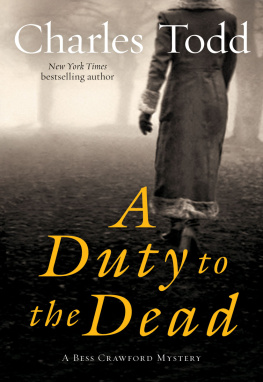
Charles Todd
An Unmarked Grave
The fourth book in the Bess Crawford Mystery series, 2012
For the National World War I Museum in Kansas City-for gathering in one place the record of a war that changed a generation and even a century.
In gratitude for asking us to speak there and for hours exploring a remarkable and moving collection.
France, Spring, 1918
I STOPPED JUST outside the ward and leaned my head against the cool wood of the doorframe. I couldnt remember when last Id slept, or, for that matter, eaten anything more than a few biscuits now and again with a hasty cup of tea.
The Spanish Influenza had already cut down three of our nursing sisters, and two doctors were not expected to live through the night. The rest of us were struggling to keep men alive in the crowded wards and losing the battle hourly. Depressing to watch the bodies being carried out, one more soldier lost to an enemy we couldnt even see.
It was an insidious killer, this influenza. Id watched men in the best of health in the afternoon gasping for breath by the next morning, tossing with fever, lying too ill to speak, then fighting to draw a next breath. Id watched nurses and orderlies work with patients for days on end without showing a single sign of illness, only to collapse unexpectedly and join the ranks of the dying. The young were particularly vulnerable. On the other hand, Private Wilson, close to forty, seemed to be spared, even though he handled the dead, gently wrapping them in their soiled sheets and carrying them out to await interment. The shed just beyond the wards was filled with bodies, sometimes stacked like lumber. The burial details couldnt keep up. And those men too were dying.
The influenza epidemic was already being spoken of as a twentieth-century plague, and no one was safe. I feared for my parents-there had been no word from Somerset for over a fortnight. Even Simon Brandon hadnt written, and that was more worrying. Was he too ill? Or trying to find a way to tell me that the Colonel Sahib and my mother had died? Every post seemed to bring sad news to the wounded or the staff, and word was that people in Britain as well as France were dropping in the streets or dying before they could reach hospital, entire families wiped out. Matron had told me that the posts were delayed because so many of the censors had fallen ill and there was no one to take their place. Cold comfort, but all I had. And as time went on, I wasnt really sure that I wanted to hear.
Sister Burrows came out the door, and I moved aside. She slipped off her mask as I had done and took a deep breath of the evening air.
Dear God, she said, and it was half a prayer. I dont know how much more I can face. Theres nothing we can do for them. Nothing. And there are the wounded to nurse as well. Its-its rather overwhelming.
She was pale with exhaustion, dark circles beneath her eyes. A mirror of my face, I thought. If I had had the time to look at my own reflection.
I ache with weariness, she went on after a moment. How are you bearing up?
As well as anyone else, I answered. It will have to end soon. The influenza. There will be no one else to infect.
Two officers leaning on canes limped past, nodding to us, and another man, turning his back to us, disappeared into the canteen. His shoulder was swathed in bandages, and I couldnt help but notice how stained and ragged they were. I knew I ought to hurry after him and ask to have a look at the wound, but I didnt have the energy. Let him drink his tea undisturbed, then report to Matron.
Today we received more influenza patients than battlefield wounded, I commented as the heavy odor of French tobacco followed in the wake of an orderly carrying a mop and pail.
I hope the Germans are suffering as badly as we are. If not, in a few weeks theyll be able to walk unimpeded to Paris.
I smiled. If they try, theyll be struck down as well. All the lines are reporting influenza cases. On a more somber note I said, Seeing that orderly reminds me. When he has time, Private Wilson has been carrying linens to the laundry and bringing back fresh supplies. And still were running short.
Ill pass the word, she said, when he comes back this way. She cocked her head to one side. I can hear the guns again. Youd think the Germans would have the decency to stop fighting until this influenza is over.
There was an hour of blessed silence earlier. I even heard a lark somewhere. I pulled my mask back into place. I must look in on the Major. His fever is soaring.
Go on. Ill bring cool water to you to bathe his face.
I thanked her and went inside. We did what we could to help each other as well as our patients. Even Matron had taken her turn bringing round the tray of tea.
I wasnt sure whether it was in the middle of the night or early morning when Lieutenant Benson died. I had sat by his bed for an hour or more, knowing the end was near but refusing to give up. My head ached from leaning forward to hold his hand at the last as hed asked me to do, and I was rather dizzy from missing my dinner, but there had been no time to spare for it.
Lieutenant Bensons death had not been a tranquil one-influenza never lets its victims slip easily away-and as I closed his eyes, I felt a crushing sadness.
Dr. Timmons came then and confirmed that the patient was dead. I went to ask the orderlies to bring the stretcher to our ward.
Private Wilson was on duty, as he so often seemed to be, and as he followed me back to the Lieutenants bedside with his stretcher bearers in tow, he leaned forward and said in a low voice, Sister, will you come to the shed with us?
I couldnt bear the thought. The next time, perhaps, I offered.
Please, Sister Crawford, he said, urgency in his voice as he quickly looked over his shoulder. I reluctantly nodded. It wasnt like Private Wilson to be so insistent or so secretive.
The Lieutenant was carefully placed on the stretcher, covered by a sheet, and our wretched little party made its way between the rows of cots to the ward door.
Private Wilson passed his torch to me, and in the chilly darkness I led the way across to the shed, a distance of about forty feet. Opening the doors for the others to pass inside, I shone the torch ahead of them, trying not to think about the men who lay here, men I had watched die. I waited, uncertain why I was supposed to be in this place but still trusting Private Wilsons judgment, while the Lieutenant was added to the rows of the dead.
When it was done, Private Wilson cast a glance in my direction, then turned to his stretcher bearers. They were as hollow-eyed with fatigue as the rest of us. Take yourselves off for a cigarette, lads. The Sister wishes to say a few words over the dead. This one was special, like.
I nearly denied it but caught myself in time. Simon Brandon would have called Private Wilson a steady man. Whatever he was about, he wanted privacy.
Grateful for the opportunity, his men touched their caps to me and disappeared in the direction of the canteen. When they were out of hearing, Private Wilson said in a low voice, Sister, what Im about to ask you to do wont be pleasant. But I think youll agree afterward that its necessary.
Mystified, I said, Very well.
He guided me deeper inside the shed. The torch beam picked out the sheet-shrouded remains on either side of me. This way, he said and took me to the back row in the far left corner. In spite of the disinfectant, the shed smelled of death, and I felt like turning on my heel and hurrying out again as quickly as I could. But I followed him as he added, The burial detail will be here in an hour. And hell be gone.
Next page

